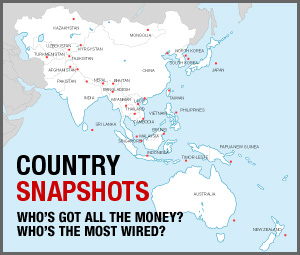
Environment
Environmental issues will become key drivers of public and private decisions across a broad range of sectors in the coming decade. The most prominent and politically sensitive of these will be climate change, with Asia set to become the global focus of climate action by 2020.
Two aspects of climate policy will assume pervasive influence. In rapidly industrializing and economically developed nations, climate mitigation (i.e. reducing greenhouse gas emissions) will increasingly affect technology and investment choices, as well as political and financial risk assessment in energy, transport, construction, manufacturing and international relations. In the poorer and less developed countries, adaptation to inevitable climate impacts will emerge routinely on the agendas of economic planning, agriculture and rural development, as well as natural resource management, natural disaster management and risk reduction. Infrastructure technologies and design will begin to shift substantially to accommodate higher climate uncertainties and lower carbon emissions. Public agencies and businesses across the region, meanwhile, will stretch to grasp a whole new lexicon of concepts, tools and practices that are still emerging.
Despite China and India’s diplomatic victory at Copenhagen in 2009, essentially defining the global climate issue on their own terms and vetoing emission targets on the basis of the ‘right to develop,’ both countries will face increased pressure to manage greenhouse gas emissions. That pressure will begin to come from bankers, investors and marketers who are wary of international regulatory or consumer backlash. But both countries will succeed in leveraging their high emissions profile and low-income status into favourable international technology transfer agreements.
The coming decade will see explosive growth of new businesses based on massive investments in clean technologies. China will devote enormous amounts of state funding to technology change, particularly in the energy sector. The country will eventually accept international emission targets because of the huge sums available through emissions trading to modernize and clean up their dirty coal industry.
But in the poorer countries of Asia, there will be mounting concern with drought, more frequent and intense storms and sea level rise. Governments and international organizations will invest more in research on crop varieties resistant to drought, or to spreading disease and pests, and will improve services to help small farmers adopt new approaches. Irrigation systems will be re-engineered. Agricultural risks will increase, threatening the gains made in recent years by the region’s poor farmers. Dawning recognition of the future need to relocate millions from vulnerable coastal areas will affect long-term development and infrastructure planning.
Governments will be challenged to devise policy incentives for investment in clean technologies, in applied research for agriculture and climate adaptation and for regional sharing of climate information, technical innovation and investment. If they fail, environmental change is likely to increase disparities and deepen political tensions both within and between nations in the region.
Stephen Tyler is President of Adaptive Resource Management Ltd in Victoria, B.C., Canada. He is also Senior Associate at the International Institute for Sustainable Development (IISD) in Canada and the Institute for Social and Environmental Transition (ISET) in Boulder, Colorado. He has worked on environmental policy and resource management issues in Asia for over 20 years, and serves as adjunct Associate Professor of Geography at the University of Victoria.











